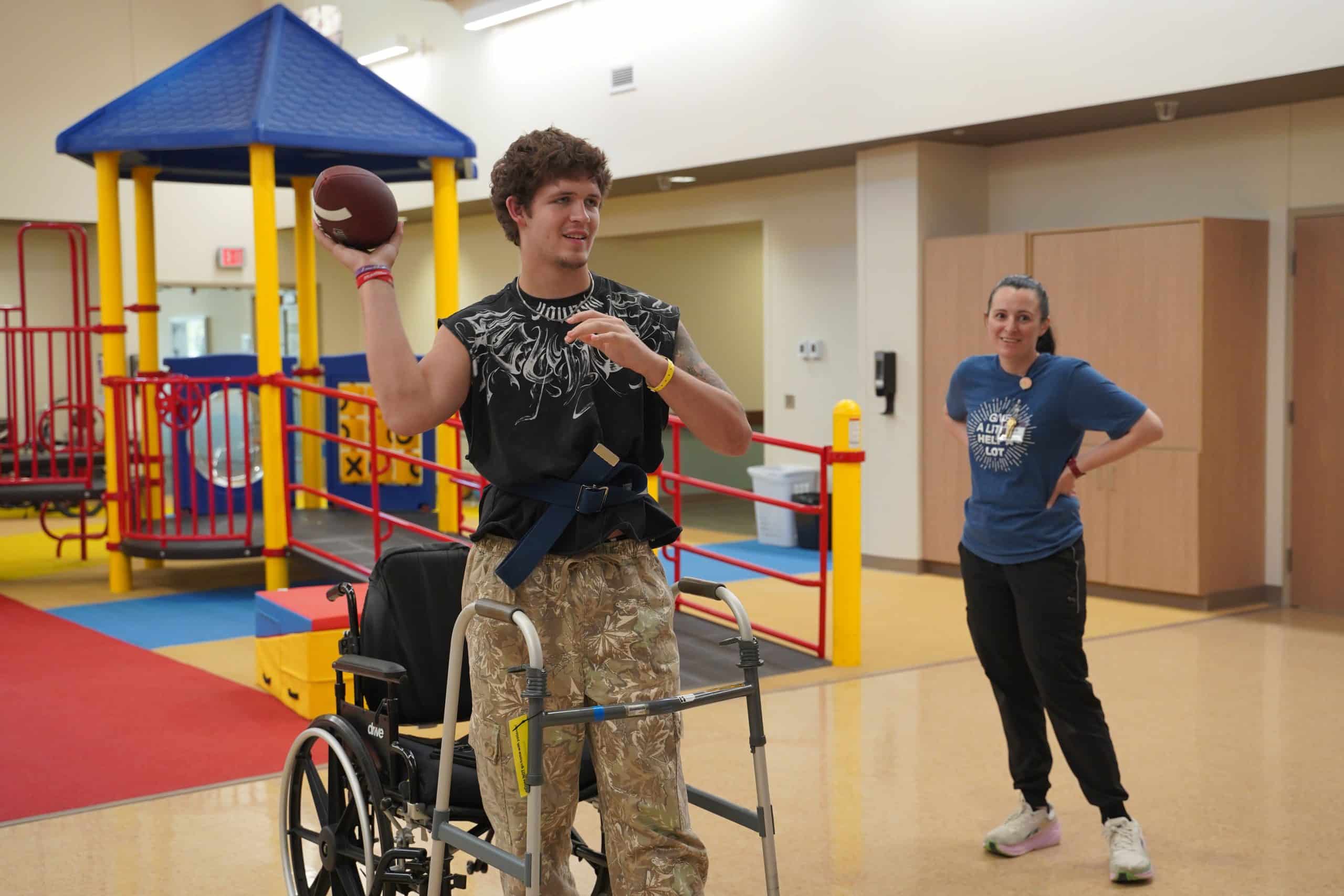When football season kicked off this fall, senior running back Eli Ferrell wasn’t in the backfield where he belonged. Instead, he was hundreds of miles away, relearning how to walk, lift weights, and find balance again.
Just weeks before his final high school season, the 6-foot-5 athlete was on top of his game. He led his team in touchdowns, earned college scholarship offers and was ready for the Friday night lights. But one August morning changed everything.
“I was driving down I-49 in Missouri, going 72 miles an hour, when I had a seizure at the wheel,” Eli said. “I ended up flipping about six times and then I was ejected.”
Eli had been sick earlier in the day and was heading to meet his mom for a doctor’s appointment. When he didn’t show up, his mom, Savannah Ferrell, felt something was wrong.
“He was four minutes from where he was supposed to meet me and wasn’t showing up,” Savannah said. “I called and texted him and got nothing, so I started driving. Two county deputies passed me going about 100 mph and this mom intuition side of me just knew.”
Eli was life-flighted to Research Medical Center in Kansas City where he spent 19 days. He had a few fractures in his foot and surface-level wounds, but the most serious injury was one that couldn’t be seen.
“He had a few stitches in his arm and had his ear sewn back up, so nothing huge on the outside,” Savannah said. “Internally though, it was scary. It was a brain bleed with a diffuse axonal injury.”
Savannah says her family knew very little about brain injuries before Eli’s accident, so she began researching the best options for his recovery.
“I only want the best for my kids, and Madonna is the best in the Midwest,” Savannah said. “Everybody said for his brain injury, this was the place to be.”
When Eli arrived at Madonna’s specialized pediatric brain injury program, he brought the same determination that once made him unstoppable on the field. His care team could see it right away.
“Eli was very strong, which I think really helped him be successful while he was here,” Megan Bergstrom, PT, DPT, Eli’s physical therapist, said. “Any time you’re really active before, it just automatically helps in your recovery.”
Eli’s physician-led care team built therapy around what motivated him most — sports. They turned the movements that once defined him on the field into tools for healing.
“He’s a high-level athlete and sports gave him meaning and purpose before therapy,” Alysa McKenny, OTR/L, CAPS, Eli’s occupational therapist, said. “It made sense for us to incorporate it into his sessions. Because those movements were so familiar, his brain could more easily relearn them.”
Still, progress didn’t come easily. Eli lost 40 pounds in the hospital and had to follow strict weight-bearing restrictions. The smallest tasks, like catching a ball or climbing steps, suddenly became challenges.
“Football and wrestling were two things I was very, very good at and I think relearning that stuff is hard for me,” Eli said. “But I think it’s God’s way of challenging me. Instead of physically, am I capable of doing it, mentally am I capable of doing it?”
Pushing through the frustration, Eli gave his all in every therapy session. Overcoming the mental hurdles led to physical breakthroughs.
“Things became easier for him every day,” Bergstrom said. “His balance improved. His confidence improved. He was able to manage his weight-bearing precautions safely and independently.”
Eli and his mom teamed up to tackle his rehabilitation, even outside normal therapy hours.
“Savannah was great at challenging him,” Bergstrom said. “I trained her on how to do independent gym and she took him on the weekends and in the evenings. Together they really worked on their PT homework.”
Eli’s speech therapy focused on memory, attention and problem-solving. These higher-level cognitive skills were ones he’d need when returning to school. Speech-language pathologist Rachel Stonacek, MS, CCC-SLP, CBIS, challenged him to plan a community outing from start to finish, allowing him to apply his skills in a real-world setting.
“When planning an outing, I like to have patients involved as much as possible,” Stonacek said. “It’s a lot of decision-making and problem-solving. It’s eye-opening for them to realize how many steps are involved in even a simple task.”
Eli chose Plato’s Closet for his outing. Stonacek said it was a fun and motivating way to practice independence.
“It was important to give him autonomy and show both him and his mom that they were ready and they can do this,” she said.
Reflecting on his recovery journey, Eli says he’s grown as a person and wants to support other young people facing similar challenges. His care team says they’re proud he’s viewing the experience in a positive light.
“When you go through something like this, you learn a lot about yourself,” McKenny said. “Eli started thinking about how he could help other kids going through similar things.”
Because of his progress, Eli was discharged two weeks early—just in time for Homecoming. He surprised his teammates and classmates by showing up on the sidelines, taking on a new role as an assistant coach.
His playing days are on hold for now, but the future possibilities are endless. And now, Eli knows he has a fan club cheering him on from Madonna. “If he keeps up his hard work, he’ll get back to doing whatever he can put his mind to,” Bergstrom said. “Obviously he has to get clearance from his doctors before he can return to sports, but I’m hopeful that I’ll see him playing in college or professionally one day.”
Back in the Game: Teen Athlete Rebuilds Strength After Traumatic Brain Injury





